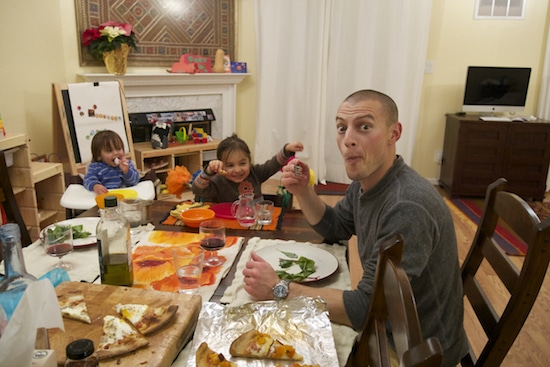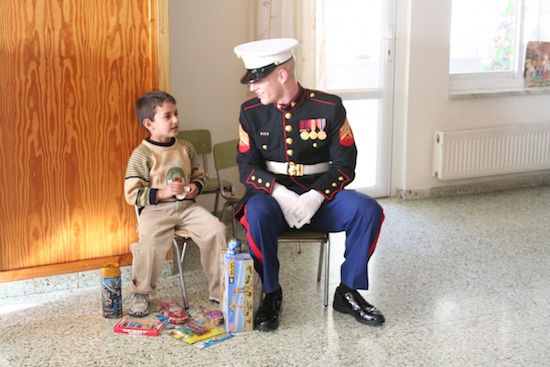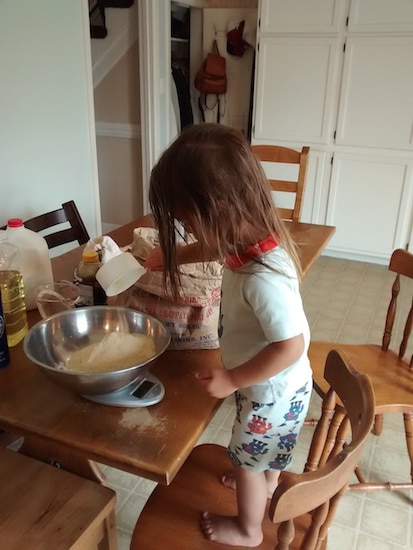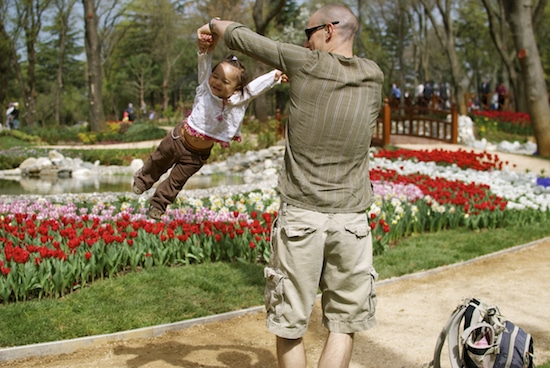
Once again we return to our So You Want My Job series, in which we interview men about their jobs and ask them about the reality of their work and for advice on how men can live their dream.
When one thinks of stay-at-home parents, it’s almost always the mom that comes to mind. The number of stay-at-home dads is on the rise though; they now make up just under 20% of parents who don’t work outside the home. It’s not an occupation that you go to college for, nor one you can bone up on with online classes. Nor is it something that many young men dream of, necessarily, but rather often arises from life circumstances. It requires almost 100% on-the-job training, and can be just as stressful and fulfilling (if not more so!) as any 9-5.
This growing demographic of full-time fathers is finding that they can do just as good (and in some cases better) of a job than stay-at-home moms, and are enjoying the gig to boot. Bo Pryor is a member of their ranks, and below he shares the ins and outs of being a stay-at-home dad with us. Bo discusses why he became a stay-at-home dad after serving in the Marines, how he stays connected to other adults and to his community, and whether his role has ever brought him grief from the outside world.
1. Tell us a little about yourself (Where are you from? How old are you? Describe what you do and how long you’ve been at it, etc.).
I’m 31 and I live in Arlington, VA and grew up close by in Bowie, MD, in the Washington, DC metro area. I’m a husband and father and my full-time “occupation†is taking care of my two little girls. I’ve been a full time stay-at-home dad since my eldest was born almost 5 years ago.
2. Why did you become a stay-at-home dad? Was this something you’ve wanted for a long time, or was it a later realization?
I became a stay-at-home dad because my wife and I decided that it would be the best situation for our children’s development and for our family’s financial well-being. I was always comfortable with the idea of raising kids because my mom was a licensed home daycare provider. That was like having 8 extra younger siblings, so I was well versed in many of the practical aspects of taking care of little ones. The idea of me staying home and my wife continuing to work was actually something we used to joke about not too long after we met and got serious. When we knew we were going to be married, then the joke transitioned into The Plan.
3. What did you go to school for? What was your job/career before becoming a stay-at-home dad?

Before becoming a stay-at-home dad my main career/job was as a Marine. I enlisted in 2003 and was fortunate enough to serve on embassy duty, so I got to see the spectrum of what the rest of the world is like: the dysfunction of an impoverished kleptocratic dictatorship in Guinea (West Africa); both the beauty and the tension of Jerusalem; the height of central European urban living in Prague. I deployed to Iraq for about a year with a reserve unit and then worked for a little bit in Kabul, Afghanistan with USAID.
Throughout that time I was working on my undergraduate degree, although not necessarily working as effectively as I should have been. My degree is in Intelligence Studies with a focus on Criminal Intelligence. Basically the Intelligence Studies program in my school was to develop skills for people working in the intelligence community or prepare folks to enter it. Ironically, after studying the field for a few years I decided that I would rather do something else entirely. Luckily, earning the degree didn’t cost much financially and I gained many good skills from the coursework such as writing (fairly) clearly and the ability to ask and research good questions.

During that whole period from 2003 to 2011 I would say that the real bulk of my education came from reading books on my own and just encountering and grappling with as many new ideas as possible. It is also worth noting that reading a great deal on my own really helped with earning my degree for a low cost. I CLEP’ed out of just about everything I could and worked with a community college for most of my lower level credits. For instance, I read the American Literature for Dummies book to prep for the CLEP exam and got a good enough score to take care of that class completely.
4. In what ways do you use those career skills “on the job†now? I’m sure a lot of people out there erroneously think that one’s education is squandered when staying home.
The discipline learned in the Marines is very helpful for me and my kids: We strive make our beds every day. Toys and books get treated properly and put away where they belong. Everyone helps with chores.
For me at least, parenting is a very physical occupation. The physical fitness I developed in the Marines means that I can have lots of fun on the playground or playing chase in the field, and I can carry a kid (or kids) around all day. Being able to get to where the fun and learning are is vital. I don’t mind pushing the stroller on hilly terrain while walking as fast as possible for a couple miles. It keeps me in shape.
5. On a related note, what kinds of qualities and skills do you think are essential for stay-at-home dads?
Kindness, curiosity, improvisation and patience are the attitudes I find most helpful in my day-to-day operations. I need to demonstrate kindness to my children, as that is the only way I know of that kindness can be taught. If we aren’t kind to one another then everyone is miserable. Approaching everyone with an attitude of kindness is an immense challenge, but one worth taking on.
It is really important for me to try to see things from my kids’ perspective, so I need to be curious about how they see the world. Also, by engaging my own curiosity I can bring things to their attention that really engage them.
Improvising a “lesson†out of anything, or a game from whatever is at hand, is really helpful. It is also helpful to be able to improvise a logical consequence for misbehavior or a distraction to prevent a tantrum.
While I may make a plan for the day, I don’t think any day of my life has ever gone exactly as planned. Patience is of course the most valuable quality for dealing with kids (and humans in general), but it is also the most challenging to cultivate and maintain. Not only do dads need to be patient with the kids but we need to be patient with ourselves. This job is not straightforward and changes over time, sometimes quickly. We’re going to have good days and bad days.
It’s also good to know how to cook, breakfast especially.
6. What does an average day entail for you? What does being a stay-at-home dad actually look like?

Most days revolve around meals, one or two planned activities, and some quiet time. I’m up around 6am to get ready for the day, see my wife off to work, and make breakfast before the kids wake up. After breakfast we clean up a little and read a book or two. We’ll take care of whatever chore we need to do (laundry, dusting, making bread) and then get ready to depart the house. We’ll either meet with friends at the park, go to a class at a nature center, or visit the library. Twice a week we have a preschool-type meetup with some neighborhood friends. After lunch we have some quiet time and my youngest naps. My eldest is learning to keep herself occupied. I drink a cup of coffee and work on something on my own.
After naps we’ll run any errands we need to, play some more, and do any prep work needed for dinner. After dinner my wife will play, read, and engage the girls in some kind of work until it’s time to get them ready for bed. By 8pm or so the kids are down in bed and my wife and I turn to any other work we need to do for the next day. We try to go to bed not too late so the next day isn’t grueling. Hmm, reading that, it seems as though it’s lots of work. Weekends are much more relaxed.
7. Stay-at-home parents obviously aren’t paid for what they do. Most of the ones I know, however, do some work on the side or have a craft/hobby that they sell online to contribute to the household, and just stay somewhat career focused and economically engaged. Do you have a side-hustle or hobby? Do you feel the need to in your role, or is it something that each person will come to differently?
I think each person approaches the side-hustle/hobby question a bit differently based on their own circumstances. My wife’s salary, combined with our frugality, provides for all of our needs, so I don’t feel the pressure to contribute to the financial bottom line. However, I know that I need to be engaged with things outside the home and I believe strongly in continuing to serve, so I am involved in lots of activities in my community. I’m an EMT and on the board of directors with a local volunteer fire department (www.cherrydalevfd.org). I am actively involved with our neighborhood citizens’ association. We host a community supported agriculture pick-up site at our home (www.lancasterfarmfresh.com). Once a month I help out with the local invasive plant removal effort.
8. Do you have to deal with any feelings of emasculation being a stay-at-home dad? How do other people react when you tell them what you do? How does your wife feel about your role?
My wife is proud of the way we do things. I haven’t dealt with any feelings of emasculation as a result of this role. My wife might attribute that to my overwhelming self confidence (learned in the Marines). Staying in good physical shape and engaging in hard labor as often as possible also keeps any sense of emasculation well away. Do male lions feel emasculated that they hang around all day while a lioness goes out and hunts? Doubt it.
Most folks I encounter respond with either “I wish I could do that†or “I don’t think I could do that†when I tell them what I do. I think most people can do this work if they want to or have to. And most people can do this work well if they try. (Another lesson learned from the Marines: most people can be trained to do most things with the right motivation.)
9. What is the work/life balance like? Are you able to get adult interaction on a regular basis? As a relatively new dad myself, I know that’s one of the hardest parts of childcare!
My main work is my life, so I don’t see much separation regarding work and life. I imagine this is a major difference from someone who works outside the home. I have been very fortunate not to have experienced much isolation at any point in my child-rearing career. Isolation is a very powerful feeling and even the little bouts I have experienced, say when a child is sick, have made me realize how valuable it is to cultivate a good network of adults around me. I am very fortunate that my neighborhood affords lots of adult interaction. There is a good group of other parents and we help each other out by watching each other’s kids or hosting preschool activities or lunch. There are other neighbors we visit with on a regular basis as well. My wife and I are lucky to have a lot of friends in the area from various stages of our life, so we are always socializing with someone on the weekends.
10. What’s the best part of being a stay-at-home dad?

The best part of being a stay-at-home dad is that I’m able to spend so much time with my kids. The next best part is seeing how amazing children are and how fast they adapt to their world. Truth is stranger than fiction, and every day I am surprised by something my kids think, say, or do (usually all three).
11. What’s the worst part?
The worst part about being a stay-at-home dad is the occasional crisis of confidence. In the long-term I have to wonder if I am making the right choices for my kids. In the short-term it’s kind of staggering to think that for better or worse, I’m responsible for everything that goes on during the day. If we have a bad day it’s because I didn’t manage the situation well.
12. What’s the biggest misconception people have about being a stay-at-home dad?
That it’s all fun and games and that men need to emulate the way women do things in order to be effective at raising kids. Stay-at-home moms may do things differently than me and they are just as effective. Likewise, I do things differently than they do and I am just as effective. Child-raising is not an innately feminine thing.
13. Any other advice, tips, commentary, or anecdotes you’d like to add?
I see parents and caregivers all the time who have completely ceded all of their authority to the child. That does a great disservice to the child, as the child has no idea of how to raise his or herself. We don’t let kids vote until they turn 18 for a reason. Never ask a child if they want to do something if that thing is something that actually needs to happen. “Do you want to put your shoes on now, dear?†is an invitation for the child to tell you that no, they would prefer not to wear shoes ever again and this is a perfect opportunity to delay departure for 15 minutes. Likewise, ending every direction with an “OK?†implies to the child that she has the option to disagree. “It’s time to go, OK?†is the same thing as saying, “With your permission, young irrational person with no concept of time, I’d like to depart.â€
With that being said, it is important to develop a sense of responsibility in kids, even really little ones. Give kids jobs they can just barely do and they will rightly feel proud when they do it. Loading clothes into the dryer or scrubbing the bathtub (with dish soap) is great for this. Helping to make bread or putting away their own dishes are great, too.
Some extra dad tips:
- It works wonders to have a big fat paintbrush with you when you go to the sandbox. Nothing else gets the sand off a kid’s face, especially when they are sweaty and crying and freaking out.
- Carry a bandana at all times. You can wipe down wet swings and slides or blow a nose or bandage a (mostly imagined) wound.
- Pocket knife is great, too. You can slice salami or apples and show your kids the inside of that acorn.
- Always carry a pen and a spare piece of paper. If you’re stuck somewhere you can always make up a game drawing letters or pictures.
- Regular washable markers work great on dry erase boards or a laminated piece of paper for reusable drawing and writing practice. They wipe off easy with a wet towel.

